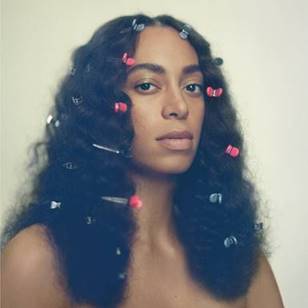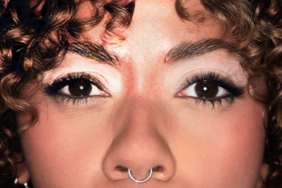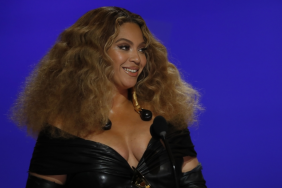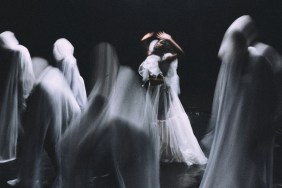Solange Knowles has been cast in multiple reductive roles. She is the younger sister of Queen Beyoncé. The Hipster Knowles. The Indie Knowles. The Rebel Knowles. The Cray Knowles – who, back in 2014, charged at her brother-in-law Jay Z in an elevator as Bey looked on passively. But, more than Frank Ocean or The Weeknd, Solange is avant ‘n’ B’s auteur. She is an activist. And she’s the boldest pop star today.
Solange wrapped the just-stealthed A Seat At The Table (ASATT), her first album in eight years, shortly before her 30th birthday in June. The singer is describing it as “a project on identity, empowerment, independence, grief and healing.” ASATT is personal, political and poetic – it charts Solange’s odyssey as a child of the black diaspora.
The Southern gal, currently based in post-Katrina New Orleans, was always underestimated. As frontwoman of Destiny’s Child, Beyoncé was the star – Solange relegated to understudy status. In 2002 she debuted with the pop ‘n’ B Solo Star – pluckily insisting on writing credits and wearing a Rastafarian hat on the cover. It comprised the cutesy duet True Love with kiddy rapper Lil’ Romeo, son of Master P – No Limit Records’ mogul. Solange’s voice was distinctive – she sounded tremulously emotive, like a baby Randy Crawford. Still, Solange was endlessly juxtaposed with Beyoncé. She subsequently became a teen bride, and mum, then divorced – all while stabilising her career as a songwriter/actor/fashionista.
However, Solange recognised that she was liberated from expectations in a way Brand Beyoncé wasn’t. She could pursue her muse – and speak forthrightly. Indeed, Solange identified herself as a “nonconforming black girl”.
In 2008 Solange presented Sol-Angel And The Hadley St Dreams – for the urban bohemian – via Geffen Records. She liaised with everyone from Pharrell Williams to Mark Ronson to legendary producer Lamont Dozier. The album honoured Motown’s heyday, but curved into psych-soul, trip-hop and ambient (sampling Boards Of Canada!). In fact, Solange laid the future R&B blueprint. Awesomely, a Village Voice review likened her to Kate Bush. Yet, on the album’s intro, God Given Name, Solange expressed latent frustration about being set against Beyoncé: “I’m not becoming expectations/I’m not her and never will be/Two girls going in different directions/Travelling towards the same galaxy/Let my starlight shine on its own/No, I’m no sister/I’m just my God-given name.” Though Sol-Angel… busted the US Top 10, and generated the cult single Sandcastle Disco, Geffen let her go. Solange snuck out the missive Fuck The Industry.
Solange continued to experiment with diverse musos. In early 2010 she was in Melbourne, tantalisingly collaborating with Midnight Juggernauts. Nonetheless, ‘Indie Knowles’ was born when Solange aligned herself with Chris “Grizzly Bear” Taylor’s Terrible Records. She cut 2012’s blithe True EP with Dev Hynes (Blood Orange), exploring Afrobeat, ’80s R&B and new wave. Losing You was a viral phenom. Solange launched her own label, Saint Records, and blog, Saint Heron, profiling other avant-soulsters. She curated a Saint Heron comp with tracks from Kelela, Sampha and… Bad Boy’s Cassie. Along the way, Solange took up DJing.
Meanwhile, Beyoncé claimed the same creative freedom, starting with 2013’s eponymous “visual album” – the inaugural stealth release a pop culture event. But would the more conservative Knowles have conceived LEMONADE – sharing her personal “truth” as a black woman – without Solange’s manoeuvres?
Following Sol-Angel…, ASATT is a diffuse, conceptual work. The title – riffing off Langston Hughes’ optimistically defiant jazz-age poem I, Too, Sing America – emphasises themes of inclusion and discourse. Solange’s new website serves as her version of the visual album, its digital book containing graphics, lyrics and photos (Sol tiny in vast exteriors). But, in contrast to Sol-Angel…, ASATT finds Solange singing over earthy, groovy Badu-esque neo-soul with twinges of low-slung funk and NOLA jazz. The synths are subtle.
Solange composed material on piano prior to seeking her collaborators – chief among them Oakland’s Raphael Saadiq, who adds his Instant Vintage. (Indie input comes from the likes of Adam Bainbridge, aka Kindness.) The guests – spanning André 3000, Sampha and Kelela – are low-key. The focus is on Solange’s voice, words and mood. There is no ‘hit’. It’s not that kind of project. The closest number to the True era is Don’t You Wait – rhythmically a bit Eye Of The Tiger.
Many songs are just about coping. ASATT opens with the transitory Rise, which Solange previewed live last year as a Black Lives Matter protest record. The sublime Weary, with warm organ, is one of three tracks “blessed by” R&B diva Tweet (remember 2002’s Oops (Oh My), blessed by Missy Elliott and Timbaland?). In the string-laden Cranes In The Sky, Solange, who’s alluded to past anxiety attacks, sings sweetly of sorrow – and how she sublimated it. Borderline (An Ode To Self Care), featuring Q-Tip, is about sanctuary – it borrows from Aaliyah’s More Than A Woman.
Tying in with some songs are unusually compelling interludes centring on racial struggle, identity and empowerment. Curiously, most are spoken by Master P – who’s apparently experiencing a nostalgic revival, Usher also paying homage in his trap banger No Limit. The OG lauds black entrepreneurialism and, in the No Limits vignette, reveals that the inspo for marketing his Southern rap empire, with its infamously high-turnover and iconically bling artwork, came from observing an Avon Lady. Yup – Make ‘Em Say Uhh!
In Dad Was Mad, Solange’s managerial father Mathew Knowles recalls the racism he confronted in his youth (“I was just lost in this vacuum between integration and segregation and racism”). It leads into the piano-heavy Mad, with Solange, allied by Lil Wayne, unpacking white indignation to black rage. The chanteuse’s Creole Mom Tina Lawson tackles ignorant misconceptions of black pride as “anti-white” in Tina Taught Me. Solange then calls for respect, and asserts her autonomy, in the horn-enhanced Don’t Touch My Hair – duetting with Sampha, South London ‘It’ guy. She’s joined by Kelly Rowland (similarly culturally diminished) and Nia Andrews for the a cappella I Got So Much Magic, You Can Have It – an ode to #BlackGirlMagic and critique of co-option.
The bitter irony is that, with ASATT arriving so soon after #Beymonade, mainstream types are bound to compare the sisters again, rather than celebrate their symbiotic – and symbolic – familial ties and common heritage. Popdom has long allowed for only two R&B queens – Beyoncé and Rihanna – but it’s time to make space for others to represent sistahood. Solange’s story isn’t that of a girl in an elevator – she is elevating.
–
‘A Seat At The Table’ is out now.












